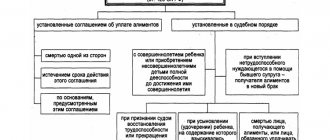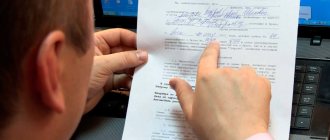Home » Inheritance » Inheritance of escheated property
3
The state can also be an heir. Property that becomes the property of the Russian Federation is called escheat. According to the law, inheritance of escheated property occurs in two cases: the first - if the testator himself indicated the subject of the Russian Federation in the will, the second - if the successors were absent for a certain period, were unable or did not want to accept the inheritance. If in the first case the state inherits according to the will of the testator, then the second requires clarification of when and what property the state can inherit.
The concept of escheat property
Escheated inheritance is material and intangible assets that become the property of the state due to the absence of a legal successor for objective reasons.
The conditions under which property is considered escheat are specified in Art. 1151 Civil Code of the Russian Federation. This includes:
- Lack of heirs by law or will. This means that the deceased has no close, distant relatives, stepmother or stepfather; none of the people living with him have the right to an obligatory share in the inheritance. If the testator made a will, but during the execution process made gross errors that resulted in the document being declared void, the property is also considered escheated. This is only possible if third parties are indicated in the will. If, according to the document, the values were intended for relatives, they can accept the inheritance according to the law in order of priority in accordance with Art. 1142-1145 Civil Code of the Russian Federation.
- Lack of the right of heirs to accept the property of the deceased, removal of legal successors for objective reasons. Heirs are recognized as unworthy only in court. According to Art. 1117 of the Civil Code of the Russian Federation, this means that the removed applicant deliberately prevented the expression of the will of the deceased in the will; contributed to the calling of other legal successors, increasing someone else's or one's share in the inheritance. Persons who have been deprived of parental rights and have not restored them until the death of the descendant are excluded from inheriting the property of children.
- Non-acceptance of inheritance by potential applicants. Acceptance of an inheritance means filing an application with a notary within 6 months from the date of death of the testator. In some cases, for example, if the birth of a child is expected - a descendant of the deceased or there are other legal successors, special deadlines come into force. Upon expiration of the general or special period, the property becomes escheated.
- Refusal of valuables, formalized by heirs. If the application indicates a legatee, the benefits of the deceased are not escheatable. Municipal authorities learn about the presence of ownerless property from a notary, a judicial authority, neighbors of the deceased, and law enforcement agencies. Stakeholders periodically inspect the facilities.
The assumption that property may be escheatable arises on the basis of the following information:
- no one lives in the premises;
- housing and communal services have not been paid for a long time;
- unauthorized persons live in the facility.
Based on this data, the administration makes a request to the technical inventory authorities, registration service or notary office about the presence of the owner of the property.
Part of the escheated property may include a debt owed to a financial institution. The state assumes the obligations of the deceased along with the income portion of the inheritance and is responsible to creditors within the framework of the value of the inheritance.
Is it possible to register it in your name and buy it from the administration or the state?
The law does not provide for a procedure within which a person not related to the inheritance can obtain preferential rights of redemption in relation to real estate (share) that has been declared escheat.
There is a rare opportunity to obtain escheated property through the court, but, as a rule, those who are not heirs or excluded from inheritance have insufficient grounds.
It rarely becomes a basis for courts to review the status or decision to transfer the status of escheated property in respect of which the acquisition statute of limitations has passed , since the rule of bona fide ownership is not followed in relation to such real estate.
The most effective algorithm is based on the ability to initiate the procedure for accepting cores. real estate by a municipal body or a subject of the Russian Federation entitled to do so by law, with subsequent redemption.
It works like this:
- if an entity does not claim rights to real estate for a long period of time, it can be forced to do so by virtue of a court decision, since Article 1151 of the Civil Code of the Russian Federation does not allow the state to refuse in such circumstances;
- after the state the body will become a co-owner of the share of the veins. premises, he will be forced to bear maintenance costs;
- most often, the cost of maintaining the housing. property, as well as including only the share of a house or apartment in the social fund, are irrational, therefore it becomes possible to profitably purchase this share from the relevant service below the market price.
Regarding other categories of inheritance, there are no legal grounds for redemption or gratuitous transfer from the state of escheatable property.
You will find detailed instructions on purchasing escheat property here.
How is escheat property inherited?
Acceptance of escheat property is not a right, but an obligation of the state. Heirs may refuse what is due by law or will if there are high registration costs or if the deceased has debts that must be transferred to legal successors.
In accordance with Art. 1157 of the Civil Code of the Russian Federation, the state does not have the right to refuse escheated property and, by default, is obliged to accept the entire inherited mass, including encumbrances.
Considering that applicants from one of the 8 lines of inheritance can legally acquire the property of the deceased, the state is conditionally the 9th line.
What does the concept mean?
If the heirs did not maintain contact with the testator, there is a danger that the provisions of paragraph 2 of Article 1151 of the Civil Code will be applied to the real estate. This article establishes the transfer of personal property to the status of escheat property. This definition refers to cases of inheritance in favor of the state in the absence of real heirs.
This situation is also allowed when a will is drawn up:
- if the applicants did not agree to accept outstanding debts along with the property;
- after the last declaration of will is declared invalid.
In Russia, the legal process differs from the approach of Western countries (France, Austria, the USA, etc.) - in the Russian Federation, the transition is based on the principle of inheritance, and in the West, property is defined as ownerless and is then transferred into state ownership after occupation. Regardless of the citizenship of the deceased, the property passes to the benefit of the country on whose territory it is located (Article 46 of the Minsk Convention of 1993 and Article 49 of the Chisinau Convention).
Unlike the acceptance of ownerless property in other countries, the right of inheritance opens up the possibility of searching for heirs within 7 lines according to the degree of remoteness or proximity of kinship, which means the transition to the status of escheat inheritance is unlikely. If the deceased had at least distant relatives.
Heirs of escheated property
In Art. 1151 indicates who can be the heir of escheated property:
- A special category includes residential and non-residential premises, land plots with real estate located on them, and shares of a real estate property. Such property becomes the property of the municipality of the district, urban or rural settlement at its location; when located in Moscow or St. Petersburg, the property becomes the property of a city of federal significance.
- Housing, acquiring the status of escheat, becomes social and is included in the housing stock.
- Other values are included in state property.
What happens to escheatable property next?
The state receives the objects and rights of the deceased last. In fact, this is an exception that is necessary to ensure that the property does not remain abandoned. In practice, there are often cases when an inheritance is not accepted by the state or municipality for years before it is discovered.
The fate of the property will directly depend on its type, that is, whether it is movable or immovable.
The property, if residential, is transferred to the housing stock of the relevant entity. In the future, it is used to fulfill duties to various categories of citizens, for example, those on the waiting list for housing. If use in this direction is not possible, it is sold at auction.
Commercial real estate can also be sold at auction. In some cases, it is transferred for use to municipal authorities, if there is such a need.
After registration by the tax authority, movable property is also put up for auction.
All proceeds from the sale of escheated property go to the budget of the appropriate level - municipal or state.
Procedure for inheritance and accounting of escheated property
Registration of escheated property occurs at the place of opening of the inheritance. In accordance with Art. 1115 of the Civil Code of the Russian Federation is the last place of residence of the testator, the location of the inherited property or more than the price of part of the movable property.
The representative of the government agency must provide the notary with a power of attorney to register the inheritance. The notary’s task is to verify the legality of issuing the certificate by examining the submitted documents:
- Death certificate of the testator, confirming the death of the owner of the escheated property. Difficulties often arise with the provision of a document, since the registry office may refuse to issue a certificate to a non-relative, and without it, the government agency receives a refusal from the notary.
- Certificate from the place of residence of the testator. It is necessary to confirm the place of opening of the inheritance.
- Documents confirming the deceased's ownership of escheated property.
- Technical and other documents that allow you to identify the object of inheritance and evaluate it based on data on location and physical wear and tear.
Inheritance of property by the state does not imply payment of state duty (Article 333.38 of the Tax Code of the Russian Federation).
After receiving the certificate, the property is subject to registration in Rosreestr.
The procedure for acquiring inheritance into the property of the Russian Federation is regulated by Instruction of the USSR Ministry of Finance No. 185 dated December 19, 1984. and is somewhat different from what is established for other individuals and legal entities. It includes several stages:
Submitting an application to a notary
The interested parties in the acquisition of ownerless valuables are local government bodies. They turn to a notary's office in order to legally ensure the safety of inherited property. The notary, in the presence of two witnesses, makes an inventory. In the absence of a notary, the procedure is carried out by the head of the local administration, another authorized person of the settlement or district who has the authority to do so (Article 66 of the Fundamentals of the Legislation of the Russian Federation on Notaries). Subsequently, those responsible for the safety of the inherited property are appointed.
In addition to the elements of the inheritance mass, the document indicates all expenses incurred from the inheritance: for caring for the deceased until the moment of death; funeral expenses; expenses for caring for the testator's dependents; payments related to the protection and management of inherited property, search for heirs.
Issuance of a certificate of inheritance
The document is received by the tax authority at the location of the acquisition object no earlier than 6 months from the date of opening of the inheritance.
The basis for obtaining a certificate may be a court decision if the property is controversial. If the deadline for accepting the inheritance has expired and the relatives have filed a claim to restore it, the tax authorities become parties to the dispute.
Along with the certificate, the notary authority transmits to the tax office an inventory of all elements of the inheritance mass. The document is signed by a notary and participants in the inventory (interested parties, witnesses, attesting witnesses).
Acceptance of valuables for responsible accounting
A representative of a tax organization checks the compliance of its actual availability with the inventory. The presence of the person previously responsible for the safety of the inheritance is mandatory. If during the inspection process a loss, shortage, or damage to objects is discovered, the Federal Tax Service makes a previous request to the responsible person to contribute to the budget an amount equal to the cost of the shortage within a 10-day period. In the absence of compensation for damage, the tax authority, within 10 days, files a claim in court to collect the required amount and bring the persons to criminal liability.
Expert review
Escheated property is subject to expert assessment, the duration of which does not exceed 5 days. As a result, an inventory and assessment act is drawn up, approved within 3 days.
Implementation
The final stage is the transfer of objects to structural units of government authorities and trade organizations under certain conditions. The assets are subject to sale, and the funds received are transferred to the state budget on the basis of a standard agreement.
Employees involved in the sale of escheat property are prohibited from purchasing it.
In some cases, it is necessary to return the value to the heirs who appear. To do this, it is necessary that the previously issued certificate of the right to inheritance be declared invalid or that the court decision to transfer the property to the category of escheat be canceled. The value is returned to the heirs in kind, and the proceeds from its sale are returned to the buyer.
If return is impossible, the state allocates funds from the budget to reimburse the cost of the irrecoverable element of the property mass.
The procedure for recognizing property as escheat
As mentioned above, successors are given six months to assume inheritance rights. If none of the candidates has submitted documents to the notary, the state becomes the only claimant to the deceased’s inheritance. Let's consider the procedure for registering escheated property as municipal property:
- 6 months after the opening of the inheritance case, the notary makes an inventory of the property. Then she is placed under arrest.
- Documents are being prepared on the basis of which the property will be recognized as escheat.
- The papers are sent to the territorial department of the tax service.
- Before recognizing the property as escheat, it is transferred to the Federal Tax Service.
- Appraisers are involved in the case and determine the value of the property.
- An act of acceptance of the transfer is drawn up.
- Escheated property is sold. The proceeds go to the municipal or state budget.
How to return escheated property
Successors who missed the deadline for accepting an inheritance for various reasons are puzzled by the question: when does property become escheatable? The legislation does not have a precisely defined period for recognizing valuables as escheat. Based on the fact that for citizens the period of inheritance is limited to 6 months, by default it is considered that after six months the property is transferred to the state.
Failure to accept the property of the deceased by the direct heirs means that other legal successors receive an additional three-month period to enter into the inheritance.
Inheritance of escheated property has no statute of limitations, therefore it can continue for an unlimited amount of time.
Is it inherited or not?
With regard to the escheatable type of property, the category of inheritance is not fully applicable; it is understood that the recipient of the inheritance has not been found; the state, in such circumstances, acts as the last and unconditional party claiming rights to the property without the right of refusal.
The procedure for accepting an inheritance is not directly applied, and the need for the state or municipality, when presenting rights, is also not implied. education express a desire to take possession within the six-month period provided for citizens. and legal entities.
We talked in more detail about the inheritance of escheated property here.
Return of escheated property
The main reason for deprivation of the right to acquire property is missing the deadline for entering into an inheritance. In some cases, a relative can restore the right to inherited property.
Reinstatement of the deadline is possible if it was missed for a good reason. To assert your rights, you will have to go to court.
The duration of the period permissible for appealing to the judicial authorities is 6 months from the time when the reasons that caused the omission were eliminated.
What is a valid reason for restoring the right of inheritance?
The legislation does not specifically indicate which reasons can be considered significant. According to established practice, this could be:
- Lack of information about the deceased from the potential successor. Related circumstances: living outside of Russia, staying in places that exclude the possibility of obtaining information (for example, working in the taiga regions of the Far North).
- Ignorance of the possibility of obtaining the property of the deceased. For example, the great-nephew of a grandmother living in another country may not realize that there are no other heirs and may not assume the possibility of inheritance.
- A condition in which a person cannot be aware of what is happening (staying in a coma, memory loss and other reasons).
Each case is considered by the court individually. The judge does not use a standard template to make a decision, but delves into a specific situation, analyzing the circumstances.
When the term is restored, you can go to court to inherit the escheated property.
How else can you restore the period of acceptance of property if it is recognized as escheat?
According to Art. 1155, you can do without going to the judicial authorities, if the other heirs are not against the inclusion of a new applicant. The state, as the sole heir of the escheated property, must agree to allocate part of the assets to the announced legal successor.
Is it possible to return property to potential heirs?
From judicial practice it follows that inheritance is often recognized as escheated unlawfully.
For example, the receivers did not know about the death of a relative. Or there was a valid reason for the delay in documents. It can be fixed. The court may return the missed deadline if the reason is valid.
Case study:
- a great-niece living abroad did not know about the possibility of inheritance;
- the potential successor working in the Far North did not have information about the death of the owner;
- the person was in a state of not understanding what was happening (with memory loss).
Municipal and state agencies become defendants. However, relatives lose the right to claim if 10 years have passed since the death of the property owner.
What actions are needed?
You should contact:
- to the court with a request to extend (reinstate) the missed deadline;
- to the Federal Property Management Agency (at the location of the disputed object) with a request for the return of material assets.
When they are sold, monetary compensation is due. It is precisely because of such claims that municipal authorities are in no hurry to inherit escheated property.
Stages of restoration of rights to inheritance if it has passed to the state:
- Formation of an application to the court.
- Preparation of necessary evidence.
- Court hearing.
- Registration of rights by the new owner (plaintiff).
You need to prepare for court:
- claim with copies;
- confirmation of inheritance rights by kinship, will;
- document confirming payment of state duty;
- confirmation of the circumstances of missing the deadline.
However, litigation is a troublesome and costly matter. And potential applicants (successors) should better accept the inheritance according to the established deadlines.
How to restore rights to escheated property?
To inherit property recognized as escheat, it is necessary for the notary to cancel a previously issued certificate of the right to inheritance.
By the time rights are restored, the inheritance may already be sold at auction. Don't despair. Regardless of the location of the property, it is necessary to submit an application for the return of escheated property.
If you contact the municipal authorities and ask to formalize a waiver of inheritance, this will not yield anything. You should follow the proposed algorithm of actions:
- Apply to the court in person or by involving a trusted person (preferably a lawyer). At this stage, it is necessary to prepare evidence that the plaintiff did not have the opportunity to find out about the death of the testator. The statement of claim may contain several demands: to restore the term, to recognize the successor as having accepted the inheritance, to recognize the heir's right of ownership. The plaintiff in court is a person interested in receiving escheated property, the defendant is the tax authority, the administration of the municipality. If the disputed property is real estate, you need to find out whether the title to it is registered with Rosreestr. It depends on this who is the owner and who will be the defendant.
- Consideration of the case in court.
- Registration of property rights in case of a positive decision.
For the trial it is necessary to collect a package of documents:
- the claim and its copies according to the number of persons interested in the case;
- check (receipt) for payment of state duty;
- document on the right to inheritance: will, confirmation of any degree of relationship;
- confirmation that the successor did not know and could not know about the inheritance of escheated property; did not foresee that circumstances would lead to the recognition of real estate or other valuables as escheat.
Result: if the court’s decision is positive, the escheated property will be returned to the legal successor in kind, and if it is sold, in monetary terms in proportion to the value.
How much does it cost to sue escheated property?
When filing an application with the court, you must pay a state fee. Since the claim relates to property, and the value of escheated property can be reliably determined, when calculating the state duty, they are guided by clause 1, clause 1 of Art. 333.19 Tax Code of the Russian Federation. Thus, the minimum cost of going to court if the cost of the claim is less than 20 thousand rubles. calculated as 4% of the value of the escheated property, but not less than 400 rubles. As the price of the inheritance increases, the state duty also increases, but in any case, its maximum value is 60 thousand rubles.
Examples of return of escheated property
Example 1. The heir missed the deadline for accepting the inheritance for a good reason: he was on a long business trip, sailing or some other place without the opportunity to obtain information about the health status of a relative. To restore the term, the heir must:
- file a lawsuit to restore the deadline for accepting the inheritance, indicating the reason and providing evidence;
- contact Rosreestr, the Federal Tax Service with a claim for the return of property.
If the court considers the reason for violating the deadline to be valid, the certificate will be canceled.
Example 2. The assignee opened an inheritance for a plot in a garden non-profit partnership (SNT) in 1995. 22 years later, he learned that the plot was transferred to the district administration, and then into the ownership of SNT due to their lack of information about the registration of the inheritance.
The heir may file a claim in court for violation of his rights and recognition of his ownership rights. The defendant will be SNT, and third parties will be Rosreestr, a notary. The main difficulty for the successor is to prove that for so long he did not know and could not know about the fact of violations, since the statute of limitations is 3 years from the date of notification of violations. As arguments, the heir will present the following evidence:
- For 22 years he used the site unhindered;
- the citizen regularly paid membership fees on his own behalf, and the management of SNT never indicated that he was not the owner of the property;
- within 6 months from the date of death of the former owner, the actual acceptance of the inheritance occurred.
Each specific case requires detailed investigation. Escheated valuables can only be returned if there are compelling reasons and evidence.
The transfer of property to the category of escheat is often the result of not only the absence of claimants, but also the negligence of legal successors under a will or law. Instead of following the approved procedure, the heirs ignore the established deadlines for accepting the inheritance, assuming that they will be able to receive the property of the deceased at any time. Instead of filing an application to accept the inheritance or actually taking possession of the object of inheritance, relatives are forced to take part in legal proceedings.
The provision on inheritance of escheated property allows the state to preserve the values of the deceased, transfer them to other persons for further use, prevent things from becoming dilapidated or obsolete, and replenish the state budget. Even without relatives, a person has the right to dispose of acquired benefits by drawing up a will. For questions regarding the return of escheated property, drawing up a will or order of inheritance in the absence of close relatives, it is recommended to contact the specialists of the ros-nasledstvo.ru portal.
FREE CONSULTATIONS are available for you! If you want to solve exactly your problem, then
:
- describe your situation to a lawyer in an online chat;
- write a question in the form below;
- call Moscow and Moscow region
- call St. Petersburg and region
Save or share the link on social networks
(
1 ratings, average: 5.00 out of 5)
- FREE for a lawyer!
Write your question, our lawyer will prepare an answer for FREE and call you back in 5 minutes.
By submitting data you agree to the Consent to PD processing, PD Processing Policy and User Agreement
Useful information on the topic
39
Entry into inheritance after death under a will
The procedure and rules for entering into inheritance under a will are established by the chapter...
20
Lawsuit to restore the deadline for accepting an inheritance in 2020
The judicial hearing of the case on restoration of the period for accepting an inheritance begins with...
39
How to enter into an inheritance for grandchildren after the death of a grandmother or grandfather
The legislation establishes two methods of inheritance: by will and by law....
10
How is the inheritance divided between the wife and children after the death of the husband?
After registering the marriage, the husband and wife acquire in relation to each other...
28
What documents are needed to register and enter into an inheritance with a notary after death?
A complete list of documents required to accept an inheritance is established in the individual...
12
First priority heirs after death
The basic principles and rules of inheritance are defined by Part 3 of the Federal Law No....
Escheatable property is the inherited property of the deceased, which in cases provided for by law becomes the property of the Russian Federation, a subject of the Russian Federation or a municipal entity.
Cases in which property is considered escheat
Inherited property is considered escheated in the following cases (clause 1 of Article 1151 of the Civil Code of the Russian Federation):
- there are no heirs either by law or by will;
- none of the heirs has the right to inherit or all heirs are excluded from inheritance as unworthy;
- none of the heirs accepted the inheritance;
- all the heirs refused the inheritance, and none of them indicated that they were refusing in favor of another heir.
The procedure for inheriting escheated property
The new owners of escheated property in the order of inheritance by law, depending on the type of such property, become (clause 2 of article 1151 of the Civil Code of the Russian Federation; clause 1 of part 3 of article 19 of the Housing Code of the Russian Federation):
1) urban or rural settlements, municipal districts, urban districts, cities of federal significance (Moscow, St. Petersburg, Sevastopol) in terms of inheritance located on their territory:
- residential premises. In this case, residential premises are included in the corresponding housing stock for social use, from which citizens are provided with residential premises under social tenancy agreements or lease agreements for social housing stock;
— land plots with buildings, structures and other real estate located on them;
— shares in the right of common shared ownership of the above objects;
2) the Russian Federation regarding the inheritance of other property.
Currently, there is no special law defining the procedure for inheriting and accounting for escheated property that passes through the procedure of inheritance by law into the ownership of the Russian Federation, as well as the procedure for transferring it into the ownership of constituent entities of the Russian Federation or into the ownership of municipalities (clause 3 of Article 1151 of the Civil Code of the Russian Federation).
In this regard, inheritance of escheated property is carried out in accordance with the general rules of inheritance established by civil law, taking into account some specific features. In particular, the acquisition of escheated property does not require acceptance of an inheritance; in addition, the refusal of the Russian Federation, a constituent entity of the Russian Federation or a municipal entity to accept escheated property is not allowed (clause 1 of Article 1152, clause 1 of Article 1157 of the Civil Code of the Russian Federation).
The notary issues a certificate of the right to inheritance to the owner of escheated property in the person of (Clause 1 of Article 1162 of the Civil Code of the Russian Federation; Clause 5.35 of the Regulations on the Federal Agency for State Property Management, approved by Decree of the Government of the Russian Federation of 06/05/2008 N 432; Clause 5 of the Resolution Plenum of the Supreme Court of the Russian Federation dated May 29, 2012 No. 9; clauses 6.21.1, 6.21.4 of the Regulations on the Department of City Property of the City of Moscow, approved by Resolution of the Moscow Government dated February 20, 2013 N 99-PP; clause 3 part 1 Article 14 of the Law of October 6, 2003 N 131-FZ):
- territorial bodies of the Federal Agency for State Property Management (Rosimushchestvo) - in case of transfer of property into federal ownership;
- bodies of municipalities or bodies of constituent entities of the Russian Federation (Moscow, St. Petersburg, Sevastopol) vested with the appropriate powers - when property transfers into municipal ownership or into the ownership of a constituent entity of the Russian Federation. For example, in Moscow, such a body is the City Property Department.
Accounting, valuation and sale of property transferred by right of inheritance to the ownership of the Russian Federation are carried out by tax authorities (Letter of the Federal Tax Service of Russia dated December 4, 2008 N ShS-6-3/892; clause 1 of the Instruction, approved by the USSR Ministry of Finance on December 19, 1984 N 185; clause 3 of the Regulations, approved by Resolution of the USSR Council of Ministers dated June 29, 1984 N 683).
Procedure for returning escheated property
You can return escheated property only in court by proving your right to receive it. To do this, we recommend following the following algorithm.
Prepare a statement of claim
Depending on the circumstances of the case, the statement of claim may contain a requirement to recognize the issued certificates of the right to inheritance as invalid, as well as a requirement to restore the missed deadline for accepting the inheritance and a requirement to recognize the heir as having accepted the inheritance.
The claim must indicate the circumstances on which you base your claims. If the escheated property has already been sold by this time, you can also file a demand for recovery from the relevant body of compensation for its cost (clause 1 of Article 1105, clause 2 of Article 1153, clause 1 of Article 1155 of the Civil Code of the Russian Federation).
The heirs who acquired the inheritance are involved as defendants (clauses 5, 40 of the Resolution of the Plenum of the Supreme Court of the Russian Federation No. 9; clause 6.21.1 of Regulations No. 99-PP):
— the Russian Federation represented by the territorial body of the Federal Property Management Agency;
— a municipal entity, a subject of the Russian Federation represented by the relevant bodies within the established competence. For example, in Moscow, such a body is the City Property Department.
Prepare the necessary documents
The following documents should be attached to the application (Article 132 of the Code of Civil Procedure of the Russian Federation):
1) copies of the statement of claim according to the number of defendants and third parties;
2) a document confirming payment of the state duty;
3) a document certifying the authority of the representative (if the application is submitted by a representative);
4) documents confirming the circumstances on which you base your claims, and copies of them for defendants and third parties. Depending on the situation, these could be:
- documents confirming the presence of heirs (documents issued by the civil registry office, or a court decision to establish kinship);
— evidence of valid reasons for missing the deadline for accepting an inheritance (for example, documents confirming the location of the heir in another country or region);
— will (if any);
— evidence of violation by the government body that accepted the inheritance of the procedure for accepting escheated property (if any);
- other evidence of the circumstances to which you refer in the statement of claim.
Submit a claim and documents to the court
The statement of claim is considered by the district court, the location of which (jurisdiction) depends on the specific circumstances. Thus, in the usual manner, a claim is filed in court at the location of the defendant. If the escheated property includes real estate, the claim is considered by the district court at the location of the real estate (Articles 24, 28, Part 1, Article 30 of the Code of Civil Procedure of the Russian Federation).
Take part in the court hearing and receive a court decision
Citizens have the right to conduct their cases in court in person or through representatives. Personal participation in a citizen’s case does not deprive him of the right to have a representative in this case (Part 1 of Article 48 of the Code of Civil Procedure of the Russian Federation).
The court decision comes into force upon the expiration of the period for appeal, if it has not been appealed. In this case, the period for filing an appeal is one month from the date of the court decision in its final form (Part 1 of Article 209, Part 2 of Article 321 of the Code of Civil Procedure of the Russian Federation).
If the decision was appealed and not cancelled, it comes into force after the court considers the appeal. If the decision of the court of first instance was canceled or changed, the new decision comes into force immediately (Part 1 of Article 209 of the Code of Civil Procedure of the Russian Federation).
Transfer the escheated property to yourself
There is currently no proper legislative regulation of issues related to the accounting and sale of escheat property (clause 3 of Article 1151 of the Civil Code of the Russian Federation; Article 4 of the Law of November 26, 2001 N 147-FZ; clause 5 of the Resolution of the Plenum of the Supreme Court of the Russian Federation No. 9 ).
Depending on the actual circumstances of the case, in order to receive property that has become the property of the Russian Federation, you should contact, in particular, the tax authority that records it. In this case, it is necessary to submit the following documents (clause 3 of Regulation No. 683; clauses 37, 39 of Instruction No. 185):
— application for the return of property;
- a certified copy of the court decision.
If the property has not yet been sold, its return is carried out by the tax authority in kind within 10 days from the date of filing the application.
If the property has already been sold, its value is reimbursed to the applicant within 10 days from the date of receipt of information from the tax authority by the state body at whose disposal the funds received from the sale are located (clause 39 of Instruction No. 185).
To return real estate, you can apply with a court decision and an application for state registration of ownership rights to Rosreestr (clause 1 of article 131 of the Civil Code of the Russian Federation; part 6 of article 1, article 58 of the Law of July 13, 2015 N 218-FZ).
What kind of inheritance is called escheat?
Article 1151 of the Civil Code helps to understand what an escheated inheritance is. When the deceased has no heirs by will or law, the inheritance is considered escheat. There are several reasons for the lack of a circle of people claiming property. This problem is not a sign that continuity as such is being abandoned. Inheritance of escheated property is still carried out, but in a slightly different format.
Who is the legal successor of such property?
Initially, the heir could have been present, but refused to accept the gift. Possibly due to carryover loan debts. This is one of the most common situations. Or the heirs have not been identified. In fact, such property can remain in a “mothballed” state for a long time if government agencies do not pay attention to it for some reason.
The situation with the transfer of inheritance implies that it remains without an owner for a certain period of time, although this is impossible in the legal field. Property always implies the presence of an owner (as follows from the name). The same applies to escheatable property. In this case, the process of determining the final owner is delayed in time.
As a result, this inheritance is distributed in favor of the regional or federal budget and goes to general state and municipal needs. For example, ownerless residential premises replenish the social fund in the subject of its location. That is, housing is transferred to the poor and in need of improved housing conditions to citizens who are in line to receive it or use it under a social lease agreement.
The heirs of escheated property are:
- settlements, districts, districts;
- Federal subjects: Moscow, St. Petersburg, Sevastopol;
- Russian Federation.
The choice of recipient of the inheritance depends on the nature of the property. Residential premises, acres of land with and without buildings, as well as other real estate (in full or in part) go to the recipients listed in the first and second paragraphs. Everything else is alienated to the state.










